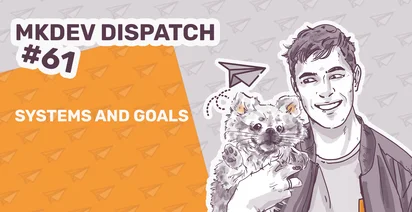Systems and Goals | ✉️ #61

Hey! 👋
I’ve read on X that it’s illegal to say “Happy New Year” after 7th of January, so I won’t.
Instead, I want to talk about Systems and Goals. It will start quite personal, but I promise, I will try to distill some work-related advice in it in a bit.
A while ago I realized, that my brain can’t think in terms of fixed goals. I used to set goals for the whole year ahead - learn new language, read X books, run a marathon. I don’t think I ever achieved any of them. Later, I realized, that the goal in itself can only serve as a temporal direction indicator. To get to any goal, you need to have a system. And, more importantly, once you achieve this goal, you need to keep going. And systems are what keeps you (or, at least, me) going after the goal is achieved.
Thus it became more important for me to build a habit of exercising every day and continuously improve my health metrics, than having a goal of running a marathon. I will run a marathon, and booking a particular date and time for marathon (aka - always have some kind of deadline) is extremely important, but I want to keep exercising even after that date and time - and for this, I need to have a schedule, a habit, a training plan and so on. Same goes, for example, with investments and so many other things.
Same applies, I believe, to any DevOps, Infra, AI, Software Engineering work. While it’s really important to reduce your cloud bill by X% by end of the quarter, it’s even more important to establish proper FinOps practices and make sure everyone is conscious about cloud spending and the role money plays in cloud architecture. It’s great to set a goal of rolling out new observability platform, but you really need to have a system of working with and acting upon your observability data.
Naturally, our work is guided by tasks and projects, which inevitably leads to the goal-oriented approach. But thinking about the systems that power the journey from one goal and task to another is a must - as well as continuous optimization of these systems. It helps to achieve those goals, but in many areas it helps to go beyond one-time goals and focus on how your infrastructure, software delivery and, ultimately, company move forward faster and faster with less and less compromises along the way.
Happy New Year.
What We've Shared
DevOps Accents #53: Team Tools in the Age of AI with Maks Semyonovykh from Miro. For episode 53 of DevOps Accents join the whole trio of Leo, Pablo and Kirill in conversation with Maks Semyonovykh, Strategic Account Manager at Miro, an online platform for collaboration that provides a shared digital whiteboard space.
The Security of Local AI Models: an excerpt from DA #52
And on the website we have these two new articles:
What We've Discovered
Multi-Cloud: That's one small step for Temporal, one giant leap for reliability. A practical example of what it takes to run multi-cloud infrastructure in a real life scenario. There are many ways to approach this, in this case Temporal aims and succeeds to setup the same kind of environment both in AWS and GCP.
We’re leaving Kubernetes: While the main idea of the article is to explain why Kubernetes appeared to be a bad fit for remote development environments, it’s also full of excellent examples of how complex your life with Kubernetes can be. Remember: never use Kubernetes unless you have a really good use case for it.
Migrating billions of records: moving our active DNS database while it’s in use: Another excellent read from CloudFlare team. If you will ever need to do near zero time migration of data, especially for a relational database, then this article will serve you as a source of many great tips.
Designing a Zero Downtime Migration Solution with Strong Data Consistency: A series of 5 articles about big long migration to a new major version of Mercaris payment system. Sometimes it feels like migrations are 90% of our work, so another detailed real life walkthrough is welcome.
GitFlops: The dangers of terraform automation platforms. Some terrifying examples of how running Terraform plan can end up in one of the worst exploits you can imagine. Definitely a good wake up call if you run IaC deployments in your CI/CD system and didn’t consider some of the security implications.
The 62nd mkdev dispatch will arrive on Friday, January 31st. See you next time!
